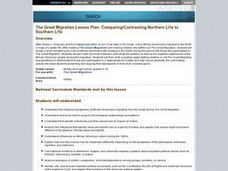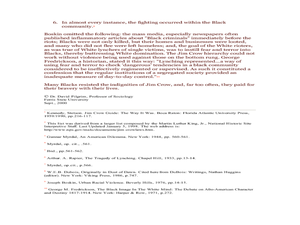Curated OER
All Work and No Pay Makes Workers Angry
Students examine and react to a current cost-cutting dilemma faced by store managers. They then study the rights of worker and employers, and draft their findings in chapters of a book examining labor laws in the United States.
Curated OER
Comparing/Contrasting Northern Life to Southern Life
Young scholars compare and contrast the lives of African Americans who moved North vs. those who stayed in the South during the era of Jim Crow Laws.
Curated OER
Jim Crow Laws and The American South
Students explore how Jim Crow laws affected the lives of people living in the south during pre and post-Civil Rights. Using a various research methods, students research various aspects of the Jim Crow south and complete a graphic...
Curated OER
Cultural Impact of Jim Crow Laws and Civil Rights Movement
Learners compare the cultural customs of people from European descent and African Americans between 1900 and 1940. Next students listen to interviews about life during the time of Jim Crow laws, and determine how life might be different...
Judicial Learning Center
Why Study Landmark Cases?
Why study landmark Supreme court cases? A helpful lesson offers a brief but valuable argument for the importance of these cases in the field of criminology. It introduces scholars to some key terms necessary for studying court cases and...
Judicial Learning Center
State Courts vs. Federal Courts
Popular culture often portrays the Feds as the most fearsome of law enforcement agencies. Yet, someone charged with a crime is considerably more likely to end up in a state court. The lesson, one of six covering the Organization of the...
Judicial Learning Center
Types of Court Cases
How can one court acquit someone of a crime, while another convicts the person of the same one? It's all because of the differences between civil and criminal trials. An informative resource provides scholars in the field of criminology...
Judicial Learning Center
The Judge and the Jury
Unless you are a lawyer, you might not understand just how unrealistic Law and Order and other legal dramas actually are. Here's a great resource to help scholars of criminology gain a more realistic perspective. The lesson outlines the...
Museum of Tolerance
Can It Happen in America?: Taking Social Action
Class members investigate the Jim Crow Laws, Executive Order 9066, the Chinese Exclusion Act, and the Indian Removal Act to gather information about not only the challenges encountered by diverse groups of Americans, but their...
Center for History and New Media
The Impact of the Jim Crow Era on Education, 1877–1930s
Even though American slaves were officially emancipated in 1865, the effects of slavery perpetuated throughout the 19th and 20th centuries. Middle and high schoolers learn about the ways that discrimination and the Jim Crow laws...
Judicial Learning Center
Levels of the Federal Courts
The Supreme Court gets all the glory, but very few federal cases make it to the highest court. An interesting lesson explores the structure of the lower levels of the federal court system. In addition to outlining the organization of...
Curated OER
Who Knows? Your Privacy in the Information Age
Teach young adults how to become advocates for their privacy in the modern information age. In a series of five lessons, learners explore their beliefs and opinions about privacy vs. the actual laws regarding who has the right to access...
Curated OER
From a Bill to a Law
Students explore government by participating in a role playing activity. In this legal system lesson, students discuss the tasks which needed to be competed in order to write a bill and have it turned into law by the President. Students...
National First Ladies' Library
How a Bill Becomes a Law
High schoolers engage in the democratic process and to learn how a bill become a law. Then they write a bill they would like as law in their classroom. Young scholars also form committees that will review the list of bills to determine...
Curated OER
The Rise and Fall of the Jim Crow Era
Students explore African American history by researching the Jim Crow laws. In this Civil Rights lesson, students define the Jim Crow laws, the reasons they were put into place, and how they were ultimately defeated. Students write a...
Curated OER
Playing With Science
Young scientists investigate the scientific concepts and principles that help make common toys such as hula hoops, yo-yos, slinkies, and silly putty work. As a class, they read "Backyard Rocket Science, Served Wet" to get a look behind...
Facing History and Ourselves
The Importance of a Free Press
"Congress shall make no law . . . abridging the freedom of speech, or of the press;. . ." Why is this guarantee of free speech and a free press the First Amendment to the US Constitution? Why are these rights so essential to a democracy?...
Curated OER
Gas Laws Experienced
Young scholars discover relationship between temperature pressure and volume as they perform research and experiments.
Curated OER
Rules and Laws of the Community
Second graders recognize and identify the need for rules in school. They also discuss the importance of safety rules at school, home, and in the community. They illustrate a rule which they have learned in class, and write letters to the...
Curated OER
Utah's Legislative Branch: How a Bill Becomes a Law
Seventh graders explain the steps by which a bill becomes a law. They research how a bill becomes a law within the three branches of Utah's government and synthesize their research and discussion in a classroom representation of government.
Curated OER
Government law
Fifth graders explain how a bill becomes a law. They watch a video and take notes on the video titled: America Rock "I'm Just a Bill." Students work in groups to create a bill to present to congress that relates to safety. They read...
Curated OER
Making Laws
Students list examples of how laws have impacted their daily lives, and describe how legislators debate, discuss, and pass into law public policies that affect individuals and society.
Curated OER
Rights of the Accused in Search and Seizure
Students explain the rationale behind the Fourth Amendment, and the types of activity regulated by the Constitution. They analyze situations, and explain a citizen's rights when an unlawful search or seizure is conducted.
Curated OER
The Role of the Executive Branch in the Lawmaking Process
Students examine Article I, Section 7, and Article II, Sections 2 and 3, of the U.S. Constitution, explain the president's role in the lawmaking process, and define the term veto.
Other popular searches
- Laws of Motion
- Copyright
- Newton's Laws
- Laws Science
- Newtons Laws of Motion
- Business Law
- Law of Exponents
- Criminal Law
- Jim Crow Laws
- Constitutional Law
- Newton's Laws of Motion
- Newton's First Law of Motion

























